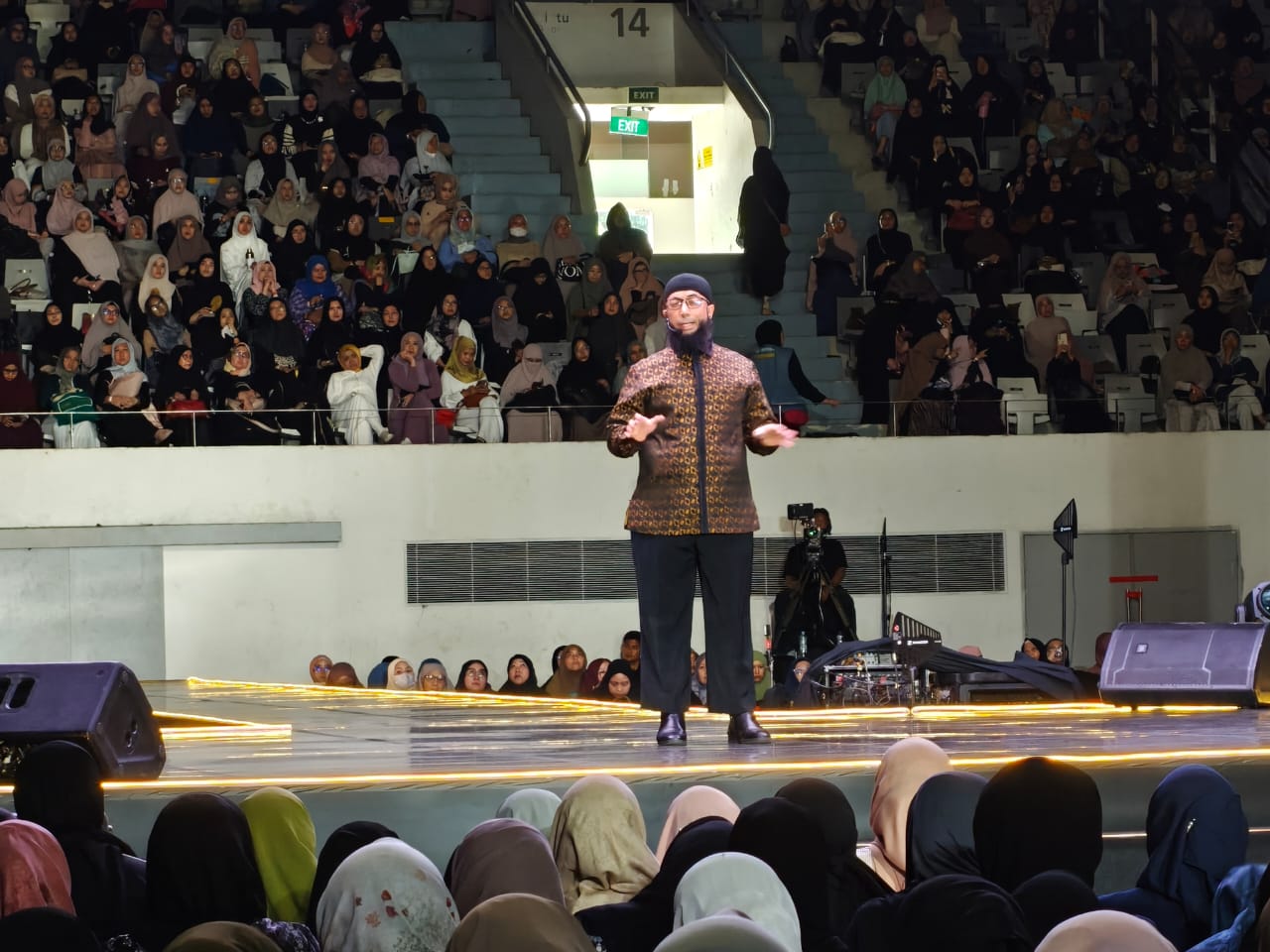Islamic Study – Not only for men, polygamy also ‘benefits’ women

Dr. Muhamad Arifin Badri at the Muslim LifeFair exhibition held by the Indonesian Muslim Entrepreneurs Community (KPMI)’s Bogor Chapter, at the Innovation Convention Center (ICC) of the National Research and Innovation Agency (BRIN) in Cibinong area, West Java province, on Saturday (June 1, 2024).
Polygamy has probably been one of the most polemical topics of all time among Muslims themselves, even though it is regulated by the Islamic law.
Bogor, W Java (Indonesia Window) – Even though it is part of the Islamic law, ‘polygamy is perhaps a topic that has been a polemic of all time among Muslims themselves.However, “remember the ground rule that all Islamic teachings contain benefits. Islamic law never does harm as it actually brings good,” Sheikh Dr. Muhamad Arifin Badri said when delivering a presentation in a talk show under the theme ‘Polygamy: Solution or Prestige’ at the Muslim LifeFair exhibition held by the Indonesian Muslim Entrepreneurs Community (KPMI)’s Bogor Chapter, at the Innovation Convention Center (ICC) of the National Research and Innovation Agency (BRIN) in Cibinong area, West Java province, on Saturday (June 1).The head of the Dirasat Islamiyah Imam Syafi’i School (STDIIS) Jember, East Java, underscored, polygamy definitely benefits men, “because he is admired here (in one place), and praised there (in the other). Now, what about women.”If as part of Islamic law it brings benefits to all, including women, then what are the benefits or advantages of polygamy for women?Sheikh Arifin continued, for women, polygamy makes ‘the door to paradise closer, and the door to hell further away.’“But I want to enter paradise, not through the door of polygamy, sheikh,” he said quoting remarks often made by women regarding polygamy, assuring that ‘polygamy is prescribed to benefit all women.’In explaining this, he conveyed a hadith narrated by Al-Bukhari and Muslim (may Allah be pleased with them), saying: The Prophet (ﷺ) said: “I was shown hell. I saw that most of its occupants were ungrateful women … The Prophet was asked: ‘Were they ungrateful to Allah?’ He replied: ‘They were ungrateful to their husbands and for the favors and the good done to them. If you show benevolence to one of them and then she sees something in you not to her liking, she will say: ‘I have never seen any good in you’.”“Women most easily fall into disbelief or forget the goodness of their husbands. And thus when a woman undergoes polygamy, the gates of hell are gradually moving away as possibilities for ungratefulness are increasingly separated,” Sheikh Arifin said, while giving an analogy that women have limitation compared to men because they will experience menopause at the age of 48-50 years, while at those ages, men are still relatively productive.“In a competition, one (man) can still run fast, while the other (woman) will have already reached the finish,” KPMI’s adviser said.On the other hand, he continued, unlike women whose movements are restricted by the Islamic law (in order to protect their honor), men are allowed to work and make activities out door. It will make the possibility of men facing temptation much greater. “So for women, maintaining family foundations is increasingly hard.”Polygamy requirements Even though polygamy can make a man ‘a king in some places’, there are some requirements men must consider before committing to polygamy.“Polygamy can become haram (forbidden in Islam) if a husband is unable to support his first wife, both physically and financially,” Sheikh Arifin stated, emphasizing that in Islam there are five rules for marriage, namely obligatory (fardh), sunnah (recommended), permissible, makruh (detestable), and even haram (forbidden).“Getting married for the first time for a young man requires capability, and if he is not able to do so, he must fasting,” he said, quoting a hadith narrated by Ahmad, Al-Bukhari, Muslim, At-Tirmidhi, An-Nasa-i, Ibnu Majah, Ad-Darimi, and Al-Baihaqi.The hadith states: “O young men, if you are able to support a wife, get married. Verily, it lowers the gaze and guards chastity. Whoever is not able to do so, he must fast as it will restrain his passions.”“It is quite a big sin if you (husbands) ignore the needs of your wives and children,” Sheikh Arifin stressed. “Wives are allowed to help with family finances, but this is not legally obligatory. “And if a wife has her own property, she can use it all for her own needs,” he continued.Polygamy storiesPolygamy is not an easy matter, as in Islamic histories, even the Prophet ﷺ himself once rejected his son in law Ali bin Talib’s (may Allah be pleased with him) plan to propose to Abu Jahl’s daughter.“The Messenger of Allah ﷺ said, ‘I am not willing if my daughter is unified with the daughter of Allah’s enemy’,” said Sheikh Arifin, stressing that the refusal was not pointing polygamy, but was stated by the Prophet of Allah in his capacity as a father.Apart from that, he continued, the story of Prophet Ibrahim (peace be upon him) with his first wife, Sarah, and his second wife Hajar showed how tough polygamy is for women.Sarah initially thought she could suppress her jealousy towards Hajar because she felt her level was far above her former slave. However, the great affection her beloved husband had for Hajar, especially after the birth of Ismail (peace be upon him), made Sarah jealous.Jealousy also ‘attacked’ Umm Salamah (may Allah be pleased with her) who had rejected the proposal of the Prophet ﷺ because she realized that she was very jealous. To the extent that the Prophet ﷺ prayed to Umm Salamah to eliminate and control her feelings of jealousy, and finally accepted the Prophet ﷺ’s marriage proposal.At the end of his presentation on polygamy, Sheikh Arifin called on Muslim couples to evaluate “what I actually married for. “Is getting married just to be oriented towards exploiting one thing without caring about the interests of other people, or am I really getting married to build an Islamic generation according to the Sharia.”Reporting by Indonesia WindowBagikan
Komentar
Berita Terkait

Islam scholar encourages Muslims to lead balanced life with gratitude and patience
Indonesia
•
12 Jan 2025

Autistic girl raises funds from painting exhibition for underprivileged families
Indonesia
•
04 Mar 2021

Over 500 employees oversee safe umrah pilgrimages
Indonesia
•
10 Oct 2020

COVID-19 cases to reach 1 mil: WHO
Indonesia
•
02 Apr 2020
Berita Terbaru

Italian President Mattarella declares Milan-Cortina Winter Olympics open
Indonesia
•
07 Feb 2026

Feature - From Beijing to Milan, Olympics fuel China's winter sports
Indonesia
•
07 Feb 2026

Feature - A story carried forward
Indonesia
•
28 Jan 2026

Prigen Conservation Breeding Ark conserves Indonesia’s endangered endemic songbirds
Indonesia
•
20 Dec 2025
